When it comes to survival medicine and emergency meds, ensuring you have a good stock of antibiotics is extremely important. You can plan for every eventuality possible but it will all amount to nothing if you contract and eventually die from septicemia caused by a scratch that you did not treat and then not have the antibiotics to fight the resulting infection!
What would it be Like in a World without Antibiotics?
We all take the infection fighting and lifesaving properties of antibiotics for granted these days, popping them into our mouths like candy whenever we have tonsillitis or a bug of some kind, completely ignorant to the fact that many of the bacterial infections they treat could so easily have killed us sixty years or so ago. I’m not suggesting that every infection that is treated with antibiotics is life threatening but even an infection that makes you so weak that you are unable to carry out your daily functions is, in my opinion, a danger to your very survival particularly in an environment where your survival is dependent on you being at your strongest.
The danger to your health wouldn’t just be down to the lack of available antibiotics; it would be due to the many other factors that increase the risk of contracting serious infections, which would inevitably lead to an increased need for antibiotics.
In a world where society as we knew it is failing, or has completely ceased to exist altogether, not only would there be no health care but nor would there be garbage collections, no access to a treated water supply at best, limited to no water at worst, sanitation and hygiene would be at pre 20th century levels, your diet would likely be vitamin and nutrient deficient; in short your post antibiotic SHTF world would be a world where infection is rife and where your body would not be in the best shape to fight an infection off on its own.
You are probably thinking that this scenario sounds pretty ominous, understandably; simply surviving a post apocalyptic type environment is going to be pretty tough without the added worry of having to contend with life threatening infections, but even though the world around you may have fallen backwards by a century or two, antibiotics will not cease to exist or, suddenly become non-effective. The problem will be that the manufacture of antibiotics will essentially stop. When this happens being able to get your hands on them when you need them will become more and more difficult as existing supplies will inevitably diminish.
In preparation for this type of situation, the only sensible solution would be to have your own supply of survival antibiotics stashed away ready for the day when you will urgently need them.
Get Medical Advice about Putting Together your Survival Medicine
The initial problem you will have with how to put together an effective store of survival antibiotics is in deciding which antibiotics you will need.
If you are like me, you will have no medical training other than maybe how to administer first aid and use the items in your emergency first aid kit so it makes sense that attaining a basic knowledge of antibiotics for survival and what they are used to treat is of paramount importance.
Disclaimer: Before I offer information about the use of antibiotics I must reiterate that I am not a trained physician or pharmacist and the information I provide is based purely on research I have found online or in books. I would definitely advise you to speak with your doctor about the safe use of antibiotics and to ask if he or she could prescribe some of the general antibiotics I’ve listed below so you could have an emergency stockpile, although you shouldn’t hold out too much hope of your doctor being this helpful.
As well as seeking professional help about the use of antibiotics please also understand that antibiotics should never be your first port of call when seeking a solution to health issues. Used incorrectly antibiotics can actually be detrimental to your health. It is also a good idea when visiting your doctor to find out whether or not you have any allergies to antibiotics, the main one being allergies to penicillin. Should you find that you do have an allergy to penicillin then you will need to avoid any antibiotic that has a name that ends in ‘-cillin’.
To avoid the misuse of antibiotics, intentionally or otherwise, it would be highly beneficial if you gathered some kind of education about the diagnosis and treatment of health issues. Failing that, make sure you have a well respected medical book to help you diagnose any problems as accurately as possible and administer treatment accordingly.
You should avoid using your survival antibiotics whenever possible, they will be like gold dust and very difficult to replace once gone.
What are the Best Type of Antibiotics to have in your Survival Medicine Bag
Antibiotics are split into two groups, broad spectrum and narrow spectrum antibiotics.
Broad spectrum antibiotics:
Broad spectrum antibiotics are used to aggressively treat unknown infections and will effectively wipe out the vast majority of bacteria in your body; unfortunately this includes the good bacteria that permanently live in your body, primarily in your gut.
Broad spectrum antibiotics are normally used when doctors are struggling to diagnose a problem or, when a patient is so ill that they need urgent treatment and there isn’t time for proper diagnosis to be carried out.
Narrow spectrum antibiotics:
As you’ve probably guessed, narrow spectrum antibiotics are used to treat specific bacteria and are used when a doctor is confident he has diagnosed what type of bacteria is causing the problem.
Without an extensive knowledge of medicine, narrow spectrum antibiotics have limited usefulness unless you, or another member of your family has a specific problem that requires frequent treatment with a certain antibiotic which also enhances your knowledge of the drug and how it is used to such a degree that your knowledge is as good as that of any doctor.
Weighing up both types of antibiotics, taking into consideration a limited medical knowledge, I would say that a survival kit consisting of broad spectrum antibiotics is probably the wisest choice but as mentioned, make sure you add any antibiotic that you have a specific need for and knowledge of to your bag.
Essential List of Survival Antibiotics
There is an extensive and ever expanding list of antibiotics that are used to treat all types of ailments and nasty bacterial infections and to try and cover them all here would be a fool’s errand so I’m not going to even try. What I will do however is provide an essential list of broad spectrum antibiotics that will provide treatment options for a wide range of the most common health problems.
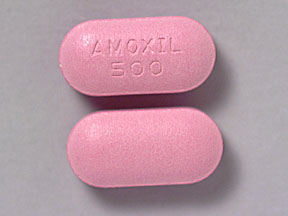
Click here for more information.
Ciprofloxacin – used for the treatment of intestinal infections such as diverticulitis, also for infections of the urinary tract, skin, prostrate, respiratory tract and anthrax. Not suitable for treating pregnant/nursing women, or children.
Click here for more information.
Metronidazole – effective in treating anaerobic bacteria in the intestine and also stomach. Liver, skin, joints, respiratory tract and brain infections such as meningitis. As with Ciprofloxacin it is not suitable for treating pregnant/nursing women, or children.
Click here for more information.
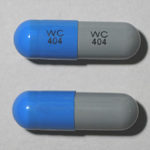
Click here for more information
Cephalexin – Cephalexin is used for the treatment of respiratory infections, ear 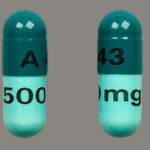
Click here for more information
The five antibiotics above will treat 9 out of 10 infections and you can add the following useful antibiotics to the list too:
- Erythromycin
- Azitrhomycin
- Doxycycline
- Sulfamethxazole and Trimethoprim
If you are able to obtain a good stock of all nine of these antibiotics you will be well on your way to having a pretty comprehensive medicine bag of antibiotic treatments but if that isn’t possible then concentrate on getting as many of the first 5 listed.
When you have your survival antibiotics the best place to store them is in the refrigerator care must be taken that they do not get frozen as this will probably stop them working effectively and possibly stop them from working at all.
Most of the antibiotics listed above will still be effective for years after they have expired but you shouldn’t trust using Doxycycline after its expiry date as it becomes toxic if it gets too old as do all Tetracycline grouped antibiotics.
Where Can You Get Antibiotics for Your Survival Medicine Kit?
So now you know what antibiotics you should have in your medical survival bag how do you go about building up a good emergency stash?
Option 1 – As mentioned earlier, you could always try to get your antibiotics from your doctor. However, to be completely honest, unless you have a like minded, prepper orientated physician who is willing to bend his ethical rule book to help you out, the likelihood of gathering your supplies from your doctor is as close to zilch as you will ever get!
Option 2 – If you live relatively close to Mexico taking a trip across the border to one of the main border towns like Tijuana will provide you with the opportunity to fill your quota of survival antibiotics. There you will find streets lined with drugstores all able to sell antibiotics legally over the counter.
All the antibiotics listed above can be purchased in Mexico and will be perfectly fine to bring back to the US, as long as you do not exceed a three months supply, they are in their original packaging, and you declare them as being for your personal use if asked by the border guards.
The only drugs you cannot import from Mexico are those listed on the Controlled Substances list which you should always check prior to a trip across the border in case the list has been updated or amendments made.
Option 3 – Order your antibiotics online. Ordering prescription antibiotics from a US based company is legal as long as you have a prescription from your doctor to cover the antibiotics being ordered, without a prescription your antibiotics will have been illegally purchased irrespective of what the selling company says..
You can alternatively order your meds from online companies based in countries where prescriptions are not required to purchase antibiotics.
However, although buying antibiotics online from an overseas pharmacy may be perfectly legal the import of them into the United States is not. Having said that I have found no record of any US citizen purchasing antibiotics in quantities that say they are for personal use being prosecuted by the FDA (US Food and Drug Administration) for receiving medication purchased online from an overseas pharmacy.
The FDA does however come down heavy on importers who order in bulk obviously to distribute for profit. Whatever way you look at it you would be breaking the law so the choice is yours.
Option 4 – Your final option is somewhat controversial although perfectly legal and is something I would only advise to do if you have been unable to stockpile antibiotics using the previous three options and there are no alternatives…
Using Fish Antibiotics in Survival Situations
Using fish antibiotics for humans has become a popular idea for preppers who don’t want to depend solely on the strict regimen imposed by doctors for regular antibiotics. This alternative can be a lucrative one when you’re preparing for a large catastrophe, especially since some products you’ll consider using might be just as effective as regular penicillin-based pills.
 The Main Differences Between Fish Antibiotics and Regular Antibiotics
The Main Differences Between Fish Antibiotics and Regular Antibiotics
When using fish antibiotics, it is essential to remember that there are a few differences between the two, so you can’t really use them the same way. The main differences are as follows:
- Typically, there are no prescription requirements for fish antibiotics. Unlike regular antibiotics, fish antibiotics can be obtained and taken in larger quantities, so it is essential to watch your dosages carefully.
- Most fish antibiotics are designed with animals in mind, so be careful to research your data thoroughly, and make sure you choose one that works for humans without any notable side effects.
- Keep in mind that the FDA approves drugs for humans separately from those used for animals. Some fish antibiotics might have fillers and additives that are not normally allowed in human drugs.
Safety and Legal Ramifications
One of the main issues you may have run into while attempting to buy fish antibiotics is that not many stores or pharmacies are open to discussing the topic of human usage. This is because there are a few legal issues to consider when buying such products. Online fish antibiotics merchants often walk a fine line, and some of the products sold for ornamental fish might not even be approved for fish. So it’s a good idea to do a background check on any online sellers you are thinking of buying from.
Considering safety, it’s important to do some research on the dosages and make sure you take only an amount that is safe for humans, since dosage recommendations might not work the same way in the case of animals in most cases.
Finally, as with any antibiotic, make sure you’re not allergic to the main active ingredient, and that the antibiotic doesn’t contain substances that were only tested for safety in animals – such as a health supplement for fish.
Choosing Products That Are Safe to Use in Survival Situations
Fish antibiotics used in survival situations could be used to save your life someday. Choosing the best products is, therefore, of crucial importance.
Be careful that you only choose products that are rated as USP grade. Although not all sellers are honest in this matter, you can check some of the criteria that should set them apart from unsafe alternatives:
- Because antibiotics are sensitive to heat, the pills should be properly packaged and shipped, so that they can remain at room temperature at all times.
- Make sure proper packaging materials are used, that don’t expose the medicine to excessive moisture, mold or plastic compounds that can be absorbed into the pill.
- Find out if the pills were tested for bacteria, yeast or mold.
As long as you buy the right products and use the right dosages, fish antibiotics can be an extremely practical choice for prepping particularly when there are no pharmacies, doctors or hospitals anymore!
Medical Disclaimer: I am not medically qualified, so I can not and will not advise the use of Fish antibiotics. Make sure you still contact your physician and discuss the matter with him/her in order to avoid unwanted side effects and make a more informed decision.


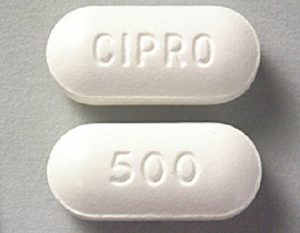
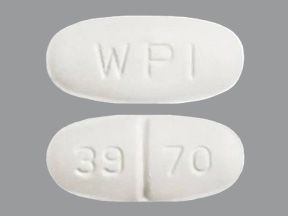
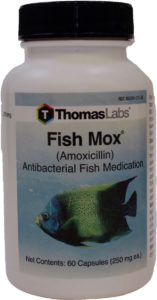 The Main Differences Between Fish Antibiotics and Regular Antibiotics
The Main Differences Between Fish Antibiotics and Regular Antibiotics